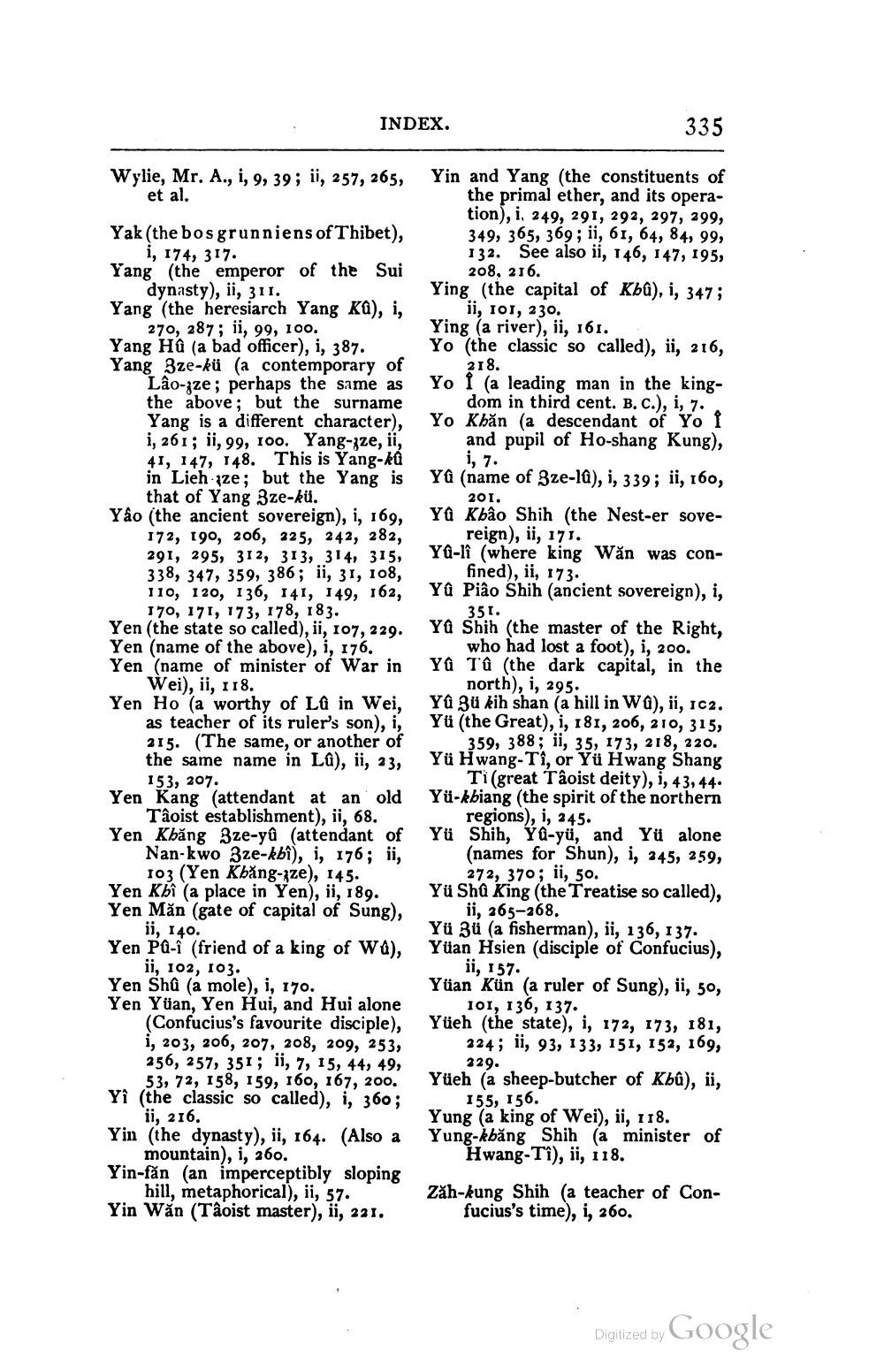________________
INDEX.
335
Wylie, Mr. A., i, 9, 39; ii, 257, 265,
et al.
Yak (the bosgrunniens of Thibet),
i, 174, 317. Yang (the emperor of the Sui
dynasty), ii, 311. Yang (the heresiarch Yang Ka), i,
270, 287; ii, 99, 100. Yang Hû (a bad officer), i, 387. Yang 3ze-kü (a contemporary of
Lâo-zze; perhaps the same as the above; but the surname Yang is a different character), i, 261; ii, 99, 100. Yang-jze, ii, 41, 147, 148. This is Yang-ku in Lieh ze; but the Yang is
that of Yang Sze-kü. Yao (the ancient sovereign), i, 169,
172, 190, 206, 225, 242, 282, 291, 295, 312, 313, 314, 315, 338, 347, 359, 386; ii, 31, 108, 110, 120, 136, 141, 149, 162,
170, 171, 173, 178, 183. Yen (the state so called), ii, 107, 229. Yen (name of the above), i, 176. Yen (name of minister of War in
Wei), ii, 118. Yen Ho (a worthy of Lü in Wei,
as teacher of its ruler's son), i, 215. (The same, or another of the same name in Lü), ii, 23,
153, 207. Yen Kang (attendant at an old
Tâoist establishment), ii, 68. Yen Kbăng 3ze-yû attendant of
Nan-kwo 3ze-kbî), i, 176; ii,
103 (Yen Kbăng-tze), 145. Yen Khi (a place in Yen), ii, 189. Yen Măn (gate of capital of Sung),
ii, 140. Yen Pa-i (friend of a king of wa),
ii, 102, 103. Yen Shů (a mole), i, 170. Yen Yüan, Yen Hui, and Hui alone
(Confucius's favourite disciple), i, 203, 206, 207, 208, 209, 253, 256, 257, 351; ii, 7, 15, 44, 49,
53, 72, 158, 159, 160, 167, 200. Yi (the classic so called), i, 360;
ii, 216. Yin (the dynasty), ii, 164. (Also a
mountain), i, 260. Yin-făn (an imperceptibly sloping
hill, metaphorical), ii, 57. Yin Wăn (Taoist master), ii, 221.
Yin and Yang (the constituents of
the primal ether, and its operation), i, 249, 291, 292, 297, 299, 349, 365, 369; ii, 61, 64, 84, 99, 132. See also ii, 146, 147, 195,
208, 216. Ying (the capital of Kbû), i, 347;
ii, IoT, 230. Ying (a river), ii, 161. Yo (the classic so called), ii, 216,
218. o I (a leading man in the king
dom in third cent. B.C.), i, 7. Yo Khăn (a descendant of Yo I
and pupil of Ho-shang Kung),
i, 7. Yü (name of Zze-la), i, 339; ii, 160,
201. Yû Kbảo Shih (the Nest-er sove
reign), ii, 171. Yu-li (where king Wắn was con
fined), ii, 173 Yû Piâo Shih (ancient sovereign), i,
351. YÜ Shih (the master of the Right,
who had lost a foot), i, 200. Yu Tu (the dark capital, in the
north), i, 295. Yû Zü kih shan (a hill in WG), ii, 1c2. Yü (the Great), i, 181, 206, 210, 315,
359, 388; ii, 35, 173, 218, 220. Yü Hwang-Ti, or Yü Hwang Shang
Ti(great Taoist deity), i, 43, 44. Yü-kbiang (the spirit of the northern
regions), i, 245. Yü Shih, Yu-yü, and Yü alone
(names for Shun), i, 245, 259,
272, 370; ii, 50. Yü Sha King (the Treatise so called),
ii, 265-268. Yü zü (a fisherman), ii, 136, 137. Yuan Hsien (disciple of Confucius),
ii, 157. Yüan Kün (a ruler of Sung), ii, 50,
101, 136, 137. Yüeh (the state), i, 172, 173, 181,
324; ii, 93, 133, 151, 152, 169,
229. Yüeh (a sheep-butcher of Kbû), ii,
155, 156. Yung (a king of Wei), ii, 118. Yung-kbăng Shih (a minister of
Hwang-Ti), ii, 118.
Záh-kung Shih (a teacher of Con
fucius's time), i, 260.
Digitized by Google




